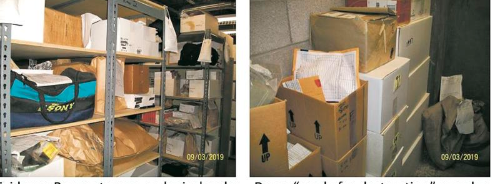Report: Police department evidence room has serious issues
Issues with the evidence room came to light after the department discovered it lost evidence in the 2017 Selena Valencia murder case.
January 11, 2020
The Santa Fe Police Department's evidence room is understaffed, its employees are undertrained, items are held in no logical order and at least one area is secured with only a $10 Master Lock, according to a report released by the city Friday night.
Pictures of the evidence room included in the report show boxes of guns and pills stacked on the floor that are overdue for destruction, items being held in areas without security and boxes of commingled case items.
Deputy Chief Ben Valdez said the department plans to start addressing the issues listed in the report as soon as Monday morning.
"We are going to sit down first thing Monday and we are going to go and start conducting the inventory and audit of all the sexual assault examination kits so we can go and account for all of them," Valdez said in a Friday night telephone interview.
The report, which was completed by SCS Northwest Consulting Services LLC owner Steve Campbell, includes a review of the department's evidence collection, preservation and management policies, as well as notes on 37 issues he found during a review of the main evidence room, the narcotics and firearm vaults, two packaging areas and a long-term evidence storage area. Campbell completed his review over three days in September and sent his report to the city Jan. 3.
Valdez said the review cost $2,500 and that there will be an additional cost for Campbell to come back to inspect the facility and do an audit to determine if it meets the International Association for Property and Evidence Inc. accreditation.
In one instance during the review process, Campbell attempted to find evidence in a randomly selected sexual assault case. But after a prolonged search, he was unable to find the evidence despite the department's records indicating it was in the facility as of March 2015. Campbell did find all evidence in the review of a randomly selected homicide case.
Other issues included staff not knowing the state's statute of limitations for criminal offenses as well as being unfamiliar with certain DNA retention statutes, items not being stored in case number order and the facility not having an area strictly for homicide, sexual assault and other critical case evidence storage.
Campbell also found that not all drugs are being stored in the department's narcotics vault and are open to potential theft, firearms are being stored in paper bags, evidence in drying lockers was not secured and regular inventories are not being done in accordance with department policy. There are also no cameras or alarms in the evidence rooms and vaults, the report states.
According to a police news release, the department plans to take five immediate steps to address the issues with its evidence handling and storage practices. These include a complete audit of all sexual assault examination kits, replacing all locks and keys to controlled access areas, purchasing evidence management software, requesting additional funding to hire three more evidence and property room technicians and one supervisor, and starting to dispose of unneeded property.
According to the report, about 40 percent of the inventory in the facility is for misdemeanor cases past the statute of limitations for prosecution.
The department is in the process of migrating data from its 1980s record management software to a modern program named One Solution. Although One Solution has an evidence management module, Valdez said, the department plans to purchase standalone software to track evidence.
The report recommends that whatever software the department chooses, it should have the ability to set reminders for when to dispose of evidence and to remind evidence technicians that items have been checked out of the facility.
City spokeswoman Lilia Chacon said the city will fund all necessary changes to not only fix the issues with the evidence room, but to make it a leader among police departments in the state.
"One of the hallmarks of this administration is its willingness to take a hard look and find these kinds of problems and fix them," Chacon said.
Issues with the evidence room came to light after the department discovered it lost evidence in the 2017 Selena Valencia murder case. Her boyfriend, Christopher Garcia, was accused of fatally stabbing her. Because of evidence being lost, prosecutors decided to not take him to trial and agreed to a deal that allowed him to plead no contest to one charge of voluntary manslaughter and two counts each of tampering with evidence and drug possession. He was sentenced to 12 years in prison.



